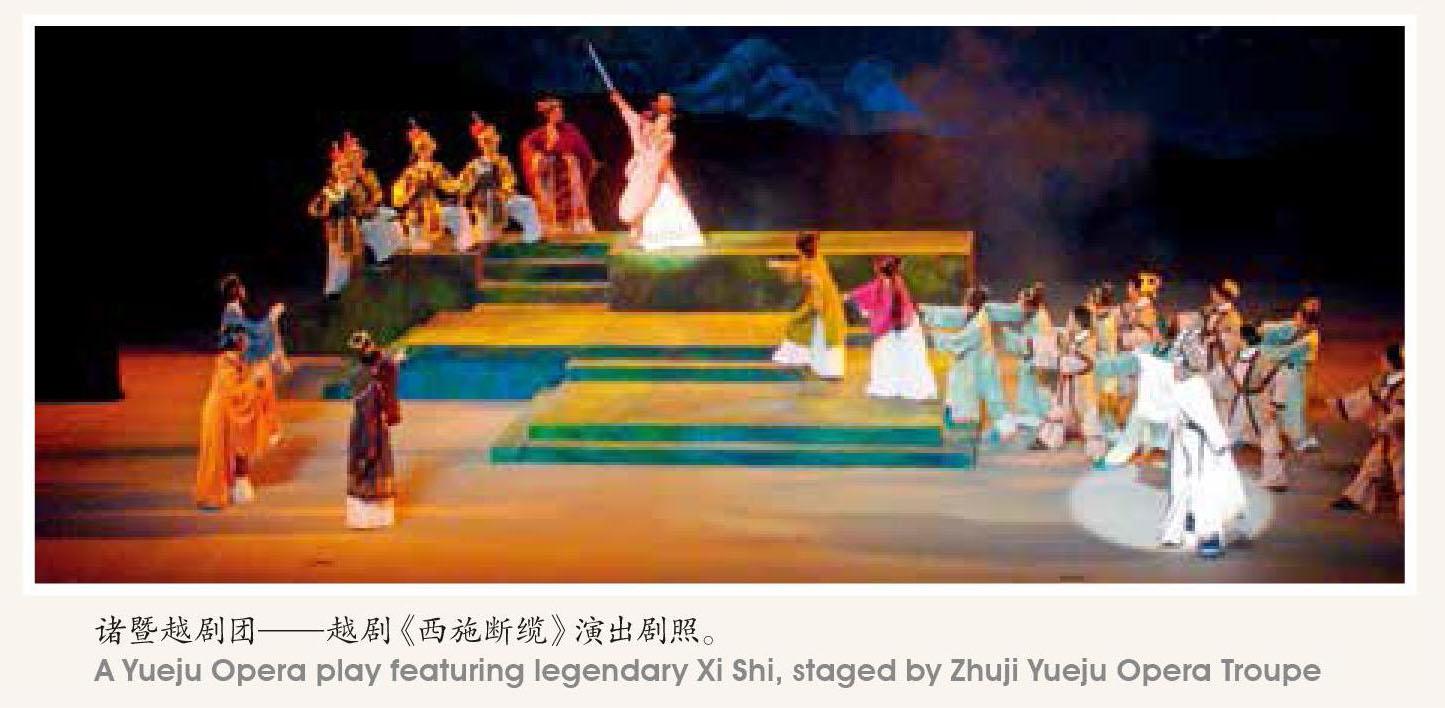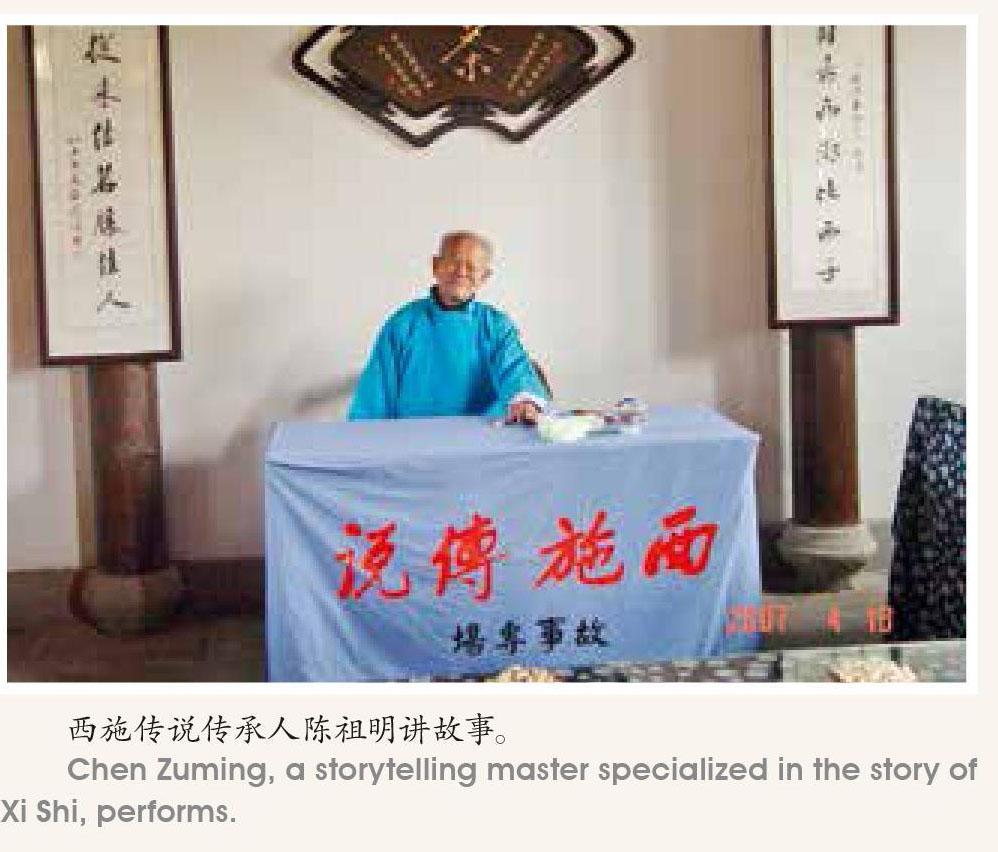关于西施的几个民间词语
2020-09-26陈荣力
陈荣力



▲文化篇
“秀色掩今古,荷花羞玉颜。”李白不愧为一个审美的高手,“荷花羞玉颜”比沉鱼落雁更具美的生动和质感。
`
浣纱
那不过是日常生活里一种常见的劳作,她也不过是江南乡野间一位平凡的女子,然而就因为二者的结合,江南地域里一条普通的溪流,从此有了一个盈满诗意的名字——浣纱溪。这样的女子其实在江南有很多很多,这样的溪流其实在江南也不在少数。然而,就因为二者的结合,浣纱的越女从此成为江南最妩媚的剪影。
“浣纱弄碧水,自与清波闲”。很难想象清澈的溪水从她嫩藕一样的脚背上流过时,是怎样的一种旖旎。很难想象欢快的水波在她凝脂一般的手掌下绽放时,又是怎样的一种华丽。这个苎萝山走下来的卖柴的女子,这个卖柴之余常到溪边浣纱的施姓女子,她的美只有与水相伴、与劳动为伍才成为极致。“秀色掩今古,荷花羞玉颜。”李白不愧为一个审美的高手,“荷花羞玉颜”比沉鱼落雁更具美的生动和质感。倘若离开了那条溪流、离开了水、离开了水里的那些荷花,西施之美便失去了依仗、失去了陪衬、失去了参照。江南女儿本来就是水之美的升华和结晶。
当然,熟谙这一道理的并非只有一个李白。“欲把西湖比西子,淡妆浓抹总相宜。”苏东坡并不在意有没有见过西施,在他眼里看见了西湖就等于看见了西施。其实同属江南之水,浣纱溪之美何尝逊色于西湖、西施呢?
1933年11月11日,37岁的郁达夫来到浣纱溪边。这个情商横溢的江南才子,喝着与浣纱溪有着同样诗意名字的富春江的水长大。在那块古朴苍褐、书有“浣纱”两字的巨大方石前久久伫立后,郁达夫写下了“百年心事归平淡,十载狂名换苎萝”的詩句,那方石上的“浣纱”两字,原是东晋王羲之的手迹。虽然郁达夫不是李白,也不是苏东坡,但从李白到苏东坡到郁达夫,这中间墨客骚人对浣纱溪、对浣纱西施的诸多感怀、咏叹都可以忽略不计。因为在中国的文人中,真正懂得西施浣纱之美的,我以为只有三人,一是李白,一是苏东坡,一是郁达夫。
去诸暨当然要去看西施,看西施当然也少不了去浣纱溪。去过了浣纱溪你才知道,那条溪流其实早已不是溪流,它是江南地域中一条人文的血脉,就像西施早已成为江南女儿的图腾一样。
美人计
句践用美人计,在中国怕是最早的。主意当然是文种和范蠡出的,但责任还在句践。句践就这点可贵,什么计谋要么不用,一用就要用得准、用得狠,一步到位,见血封喉。如吃屎、如赐剑文种自杀之类。而且句践又极有耐心,为将一个率真的村姑打造成一件报仇复国的暗器,“饰以罗毂,教以容步,习于士城,临于都巷。三年学服而献于吴。”卧薪尝胆尚且十年,三年在句践看来自是小菜一碟。
“句践征绝艳,扬蛾入吴关。提携馆娃宫,杳渺讵可攀?”集三千宠爱于一身的西施,在苏州吴王宫里的日子与苎萝山下的乡村生活自然是天壤之别。别的不说,就说那个筑在灵岩山上的馆娃宫吧,铜钩玉栏,酒绿灯红,抚琴台、玩月池、浣花池、采香径、脂粉塘别出心裁、一应俱全。尤其是那条大瓮上覆以厚板的“响屐廊”,更是千金博一笑的极致。灰姑娘成为白雪公主的童话,想必也望尘莫及。可惜浣花池不是浣纱溪,馆娃宫里的西施已不是浣纱的村姑,而是一件精美绝色的物品。
总思量生活在吴王宫里的西施,会是怎样的表情?应该不外乎两种吧。其一,高扬蛾眉,俏启皓齿,嫣然一笑百媚横生,春风惊艳姑苏城。但这样的笑里藏着刀,这样的刀上蘸满仇,因为这里的西施已不是浣纱溪边的村姑,她是一件报仇复国的暗器。其二,颦眉皱目,缱绻慵懒,别无选择随遇而安,听天由命逢场作戏。这样的麻木里盈着无奈,这样的无奈里满是心酸,因为西施不是一件报仇复国的暗器,依然是来自浣纱溪边的一位村姑。与其是前者,我宁愿相信是后者。报仇复国的重任,荷载在一位柔弱的女子身上,荷载在一位率真普通的村姑身上,这是天下最大的残酷。男人们都在干什么?!
记载句践用“美人计”的《越绝书》说,“越乃饰美女西施,使大夫种献之于吴王……吴王大悦。申胥谏曰:不可,王勿受。吴王不听,遂受其女,以申胥为不忠而杀之。”大凡“美人计”中主角大都不会留下一个好的名声,西施却是一个例外,即使伍子胥因她而死也无妨。因为她从来就不是一件武器,她是一位率真、普通的村姑,在这一点上,老百姓的眼睛始终是雪亮的。
沉江
关于西施最后的归宿,一直是个谜。史料和民间大致有三种说法。一是西施跟了范蠡一道去做生意。范蠡功成身退后改名陶朱,生意做得很大,成为中国商贾的鼻祖。在我老家附近有一座陶朱庙,香火至今鼎盛。一说西施乘舟浮海或泛五湖遁踪。前几年看到一篇文章,说日本发现西施的后裔,又说东南亚也有。西施到底去了日本还是去了东南亚,恐怕要看当时的风向了。还有一说,则有点让人难受,西施在越兵首次攻入吴都、火烧馆娃宫时,就沉江而死了。
前两说细想起来皆有破绽。其一,精明过人的范蠡在逃避“狡兔死,走狗烹;高鸟尽,良弓藏”的命运时,是不可能带走曾被沦为夫差玩物的西施的。虽然当年范蠡也是这一“美人计”的始作俑者,但他还没有这份忏悔之心、救赎之情,范蠡要怜香惜玉,也轮不到西施,何况他自己的风险尚大得紧呢。其二,乘舟浮海或泛五湖遁踪,想来西施当年还不具备这个资源和条件。因此倘用排除法,西施的沉江而死这一说虽让人难以接受,倒也是唯一说得通的答案。
蹊跷的是,最早记述西施其人其事的一些典籍如《墨子》等,将西施的沉江作为与比干之殪、孟贲之杀、吴起之裂相提并论的事实。“是故比干之殪,其抗也;孟贲之杀,其勇也;西施之沉,其美也;吴起之裂,其事也。”(《墨子·亲士》)墨子和西施是同时代人,他的说法应该有点权威性。
而西施的沉江而死,是他沉还是自沉,又有不同的版本。他沉说,说是夫差或句践将西施沉了江。夫差一向视西施为宝物,又至死未知西施是句践打造的一件亡国的暗器,所以想来不大可能。而在句践的眼里,西施既不是良弓又非良犬,不会影响他稳坐龙基,杀了西施倒有损于自己道德上的正确,想想也犯不着。如此下来,自沉于江便成了西施惟一的选择。在西施看来,“玩偶之家”的吴国已灰飞烟灭,她何处寄身;故国虽在,但她回得去吗?所以自沉于江便成为别无选择的选择。《墨子》说“西施之沉,其美也。”也惟有自沉,才是悲剧中最打动人心的一幕。
只是我们不知道西施到底自沉于何处?按西施的意愿,想来是最愿意回归浣纱溪的。质本洁来还洁去,这是江南水做的女儿的天性,无论是村姑也好,还是曾经是报仇复国的暗器也罢。
Phrases from Legend of Xi Shi the Beauty
By Chen Rongli
Stories about Xi Shi the Beauty are legendary that some phrases from the stories are now very much alive and used in describing various situations. The following are three phrases.
Huansha or Clothes Washing
Washing clothes in river was a job done by women in Jiangnan in the past. Even now, some rural women still wash clothes in nearby streams or rivers. Xi Shi was a clothe washer. The stream zigzagging through the village where she lived and washed clothes was therefore called Huansha Stream.
Because of Xi Shi, girls washing clothes in river became a symbol of Jiangnan in poems. Li Bai, presumably the greatest poet of the Tang Dynasty (618-907), wrote a poem about the beauty of Xi Shi, which mentions her washing clothes in stream water. In the traditional culture, Xi Shi wouldnt have been that beautiful without the stream, the lotus flowers in the stream, and the crystal water. Li Bai wasnt the only poet who knew the importance of the water. Su Dongpo of the Northern Song Dynasty (960-1127) compared the beauty of the West Lake to the beauty of Xi Shi in a poem. The comparison is more than about the beauty. In Chinese, west is pronounced as Xi. Thats why so many people believe that the lake is named after Xi Shi the beauty. Yu Dafu, a poet and novelist of the 20th century and native of Hangzhou, visited Huansha Stream in November 1933. He admired 浣紗, meaning clothe washing, carved on a stone in the village where Xi Shi was born and brought up. It was originally handwritten by Wang Xizhi, presumably the greatest calligrapher in Chinese history. Yu Dafu wrote a poem in commemoration of Xi Shi. Those who visit Zhuji will inevitably visit Huansha Stream. The stream is more than a physical existence. It is something that shines in the culture of Jiangnan. Xi Shi is a symbol of young girls in Jiangnan.
Honey Trap
In Chinas written history, King Goujian of the Yue State may have been the first person who perfectly used the strategy of beautiful women. The idea was first proposed by his two ministers, but the king took all the credits for using Xi Shi so effectively. Xi Shi and another young girl spent three years learning to be perfect spies and perfect concubines in the Yue State before they were sent to the Wu State, the archrival of the Yue State.
Drowned in River
What Xi Shi did after the Yue State successfully revenged the Wu State has remained a mystery. History and folktales offer three different finales. Some say that Xi Shi went away with Fan Li, one of the two ministers who came up with the honey trap scheme. Fan Li became a successful business tycoon. In folklore, Fan is the forefather of successful business people in China. Some people say that Xi Shi escaped to a life as a reclusive. But a woman as beautiful as Xi Shi living as a solitary reclusive in wildness and surviving all the challenges and difficulties looks highly unlikely. Some say that Xi Shi fled to Japan and some claim that the beauty fled to a Southeast Asian country. Some historical accounts state that Xi Shi was drowned in river and killed when the Yue army stormed the capital of the Wu State and set fire on the palace where she lived as a lady. One of the historical statements was given by Mozi, a famous Warring States philosopher, inventor and master engineer. A contemporary of Xi Shi, Mozi might have known better.
Even if Xi Shi was drowned in river, whether Xi Shi committed suicide and drowned herself in river or she was drowned by the King of the Wu or the King Goujian of the Yue remains unclear. On second thought, it might be right to guess that Xi Shi drowned herself.
